Part 1 A team to be feared - Results
and table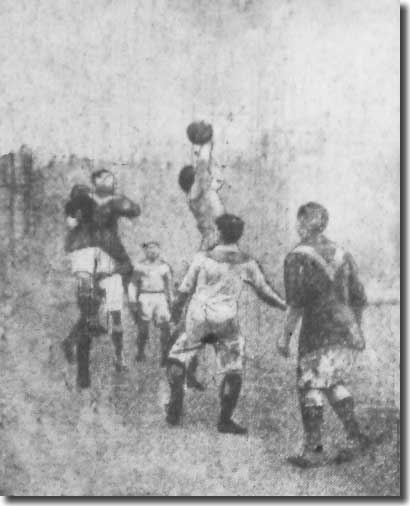
To the immense satisfaction of their supporters, Leeds City entered 1914
among the favourites for promotion to the First Division. A strong run
through the autumn months included a
record win against Nottingham Forest and they had suffered just one
defeat since the middle of October. The Yorkshire Evening Post
sagely cautioned, 'Among the Leeds City supporters there is a very confident
feeling regarding the future. It is too early yet to strive at any definite
conclusions, for Leeds City have a formidable programme towards the end
of the campaign, but nothing succeeds like success, and providing the
team holds together they must continue to be strongly fancied for promotion.
What the team themselves have to guard against is over confidence.'
The early signs were positive - City opened the New Year in fine style
with a breathtaking destruction of Stockport County by five goals to one.
They were three goals to the good within a quarter of an hour through
efforts from Jimmy Speirs, John Jackson (his first for the club) and Billy
McLeod. Jackson and Ivan Sharpe added further scores before the break.
County managed a consolation effort mid way through the second period
but by then the issue was long since settled. As the Leeds Mercury
noted, 'The forwards did not exert themselves too much after the interval
as they were evidently satisfied with the formidable lead they had gained
in the first half.'
The following week brought FA Cup action. City's opponents were Gainsborough
Trinity, who were drawn out of the hat as the home team. Trinity, who
lost their Football League status in 1912, agreed to waive the right to
stage the game at their Northolme ground when City guaranteed them a payment
of £500 so to do, reasoning that a larger crowd would attend in Yorkshire.
The move backfired financially for City, as the 14,000 crowd provided
receipts of just £520.
City began as if they would simply brush Trinity aside and Jackson opened
the scoring within three minutes with a fine drive from Jack Hampson's
pass. George Law made it 2-0 from long range in the 17th minute after
goalkeeper Heath had fisted away a shot from Sharpe. McLeod added another
from close quarters on the half hour and Speirs then had an effort disallowed.
At that stage it looked like the Peacocks might run riot.
However, they became complacent, giving Trinity the opportunity to rediscover
their backbone. The Lincolnshire men pulled one back just before half
time through centre-forward Harold Ibbotson. The same player added a second
immediately after the resumption. The result was in some doubt until Jackson
grabbed a second goal ten minutes from time. A fifth by McLeod was disallowed
for offside.
City stumbled thereafter into a brief but very damaging loss of form;
they lost three consecutive League matches and went down 2-0 to West Bromwich
in the second round of the Cup.
The game with West Brom, on January 31, offered City the opportunity
to avenge the Cup defeat they suffered at the hands of Albion two years
earlier when losing out to a controversial late goal.
There was huge interest and speculation as to whether Leeds could spring
a surprise against one of the finest sides in the country. Founder members
of the Football League, Albion had won the FA Cup twice in the 1890s and
were captained by England left-back Jesse Pennington.
back to top
Earlier in the season, Pennington had been involved in a match fixing
controversy.
A man calling himself Sam Johnston, but who was later identified as Pascoe
Bioletti, had 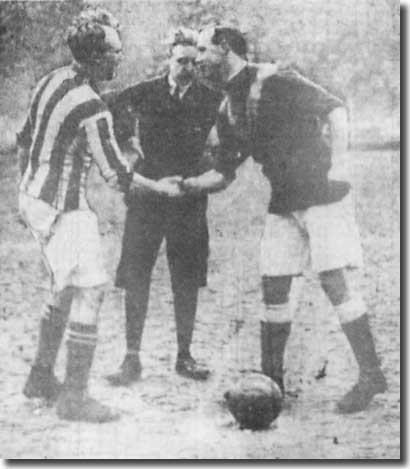 visited
Pennington's shop in Smethwick in November and asked him whether it would
be possible to influence the outcome of Albion's match with Everton at
the end of the month. He offered Pennington £55, or £5 for each player,
in the event of a draw or an Albion defeat. Bioletti refused to pay until
after the match, but agreed to formally document his commitment on a memorandum
sheet. Pennington reported the details of the exchange to his club chairman
and the police and showed them the memorandum.
visited
Pennington's shop in Smethwick in November and asked him whether it would
be possible to influence the outcome of Albion's match with Everton at
the end of the month. He offered Pennington £55, or £5 for each player,
in the event of a draw or an Albion defeat. Bioletti refused to pay until
after the match, but agreed to formally document his commitment on a memorandum
sheet. Pennington reported the details of the exchange to his club chairman
and the police and showed them the memorandum.
On the day of the match, Bioletti called again at Pennington's shop and
asked whether they had a deal. The player indicated he had not yet had
a chance to speak to his team mates. It was agreed that Bioletti would
attend the match and Pennington would signal to confirm whether the deal
was on. Bioletti showed Pennington a money bag, 'and shook it, making
the contents jingle'.
Pennington never said a word to any of the other players about the arrangement,
but coincidentally the match ended with honours even. After wards Pennington
met Bioletti, ostensibly to collect the pay off. When Bioletti duly handed
over the cash, detectives moved in to arrest him. The police found a book
of football betting slips for a £1,500 bet he had placed on the game.
Pennington was the chief prosecution witness at the trial, where Bioletti
pleaded guilty and was sentenced to five months' imprisonment. He also
received a six months' sentence for trying to bribe Birmingham full-back
Frank Womack in a similar incident.
It was later revealed that Bioletti was the father of William Alfred
Bioletti, who 'carried on a most extensive football coupon betting business
in Geneva under the name of White Fisher. That firm issued circulars by
thousands, inviting unwary people to back certain teams, and offered most
advantageous odds.'
Pennington was not unduly disturbed by the episode and shook hands with
Jimmy Speirs as the two captains tossed for choice of ends at the start
of the City-Albion tie.
According to the report by Martin Jarred and Malcolm Macdonald on the
game, 'Gates to the sixpenny entrances at Elland Road were shut tight
15 minutes before the kick off,' and 29,733 spectators (the best crowd
of the season) flocked into Elland Road to witness the contest, paying
receipts of £1,397.
With Evelyn Lintott making a rare
appearance at right-half, it was City who showed best in the first half,
after weathering early Albion pressure, and Speirs, Hampson and Jackson
all went close to opening the scoring.
The Midlanders remained cool under pressure, with keeper Hubert Pearson
in fine form, and their greater fitness told in the closing seconds, just
as a replay seemed certain and spectators had started pouring out of the
stadium.
With seconds remaining, right winger Claude Jephcott broke away down
the flank and found Alf Bentley in space. The centre-forward trapped the
ball and hammered it home left footed. According to the Yorkshire Post,
'Hogg made a desperate dive at the ball, but could not reach it, and it
was only when he rose and picked the ball out of the net that the crowd
realised that the Albion had scored.' In injury-time, Jephcott carved
through City's tiring defence and added a second from close quarters.
It was cruel reward for City's determined performance.
Yorkist in the Mercury: 'Those closing minutes can well be imagined.
The match was finished in semi darkness, and a Bradford colleague made
the remark, five minutes from the end, that it would be a great pity if
either side was to snatch a goal in the gathering gloom. But it was the
luck of the Albion to snatch two goals. Their big contingent of followers
naturally went wild with delight, but the vast majority of the crowd,
as they squeezed their way out of the ground, must have marvelled what
a funny game football is.
'The game was to a great extent spoiled by a gusty wind which blew from
the Elland Road end of the ground. The playing pitch was in excellent
condition and it seemed a good omen for Leeds City when Speirs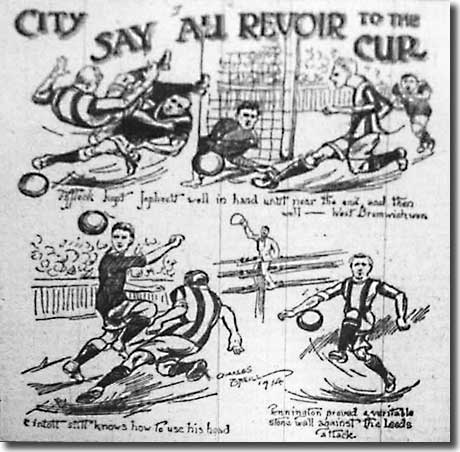 beat Pennington for the choice of ends, and thus gave Leeds City the assistance
of the breeze in the first half.
beat Pennington for the choice of ends, and thus gave Leeds City the assistance
of the breeze in the first half.
'Leeds City did most of the pressing, but they were met by a magnificent
defence, the work of the Albion half-backs and backs against the wind
being really great. One of the features of this half was Sharpe's placing
of corner kicks. He had four of these and each time he put the ball beautifully
into goal. On the first three occasions Pearson punched the ball away,
but on the fourth occasion, Hampson nearly scored with a header, the ball
going just inches too high.'
back to top
Two of the other defeats suffered by City in their poor run were at the
hands of promotion rivals Bradford Park Avenue and Notts County, though
the most worrying reverse was the ultimate one at Leicester on 7 February,
as reported by Yorkist.
'Soccer football is in a poor way at Leicester at present. Fosse have
been doing badly, and in six League games since Christmas they had lost
five and drawn one, losing at home to Blackpool and Woolwich Arsenal.
As the club needed funds, they recently transferred Clay and Sparrow to
Woolwich Arsenal, and this incensed the majority of the Fosse followers.
'The visit of Leeds City attracted no more than four thousand spectators.
Fosse were expected to get another licking, but to the great delight of
the crowd, the players gave one of their best displays of the season and
won with ridiculous ease.
'It was a remarkable game in many respects, and the scoring was curious.
Leeds City appeared to derive a great advantage by winning the toss, for
there was a strong wind blowing almost straight from goal to goal. The
Fosse, however, took the lead eight minutes after the start, and twenty
minutes later they got two more in rapid succession, and thus made the
issue practically certain.
'Leeds City never looked like saving the match. They reduced the lead
of the Fosse fifteen minutes from the end, but Fosse fully held their
own for the remainder of the game and scored two more goals in the last
five minutes.
'The result flatters the Fosse considerably, for they are not a strong
side. They are mostly young players and under ordinary circumstances Leeds
City should have beaten them comfortably. But Leeds City are demoralised
at present. They touched zero on Saturday and gave a very poor account
of themselves.
'There was not one man on the side who played up to form with the possible
exception of Croot, who filled the outside-left position through Ivan
Sharpe being engaged in the amateur international at Plymouth. Croot played
with plenty of dash, but all the other members of the team appeared to
be demoralised and could do little right.
'It certainly seemed a risky experiment in playing Jackson at outside-right.
He was never comfortable in that position and before half time he returned
to his old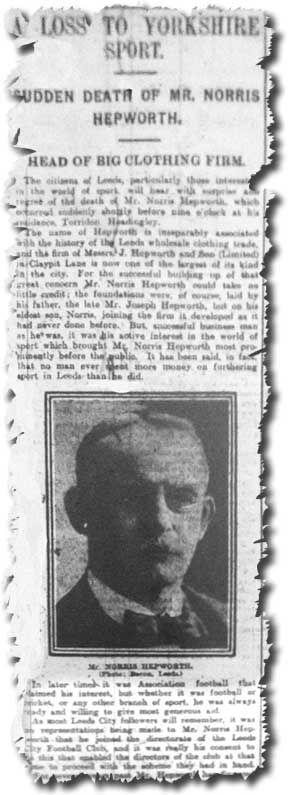 place at inside-right, Price going on to the wing. The forward line was
disjointed all through the piece.'
place at inside-right, Price going on to the wing. The forward line was
disjointed all through the piece.'
City still retained fifth place, but were six points off the promotion
spots. Again, however, inconsistency was their watchword and they bounced
back emphatically by defeating Wolves 5-0 on 14 February.
The Yorkshire Post reported, 'Seldom have the Leeds forwards been
seen to greater advantage this season.' City were a single goal ahead
at half-time, through McLeod, but the centre-forward completed his hat
trick in the second period and Speirs and Sharpe added others to complete
the rout.
Elsewhere that day, though pacesetters Notts County won at Glossop, all
City's other rivals had setbacks. Woolwich Arsenal, Bradford, Hull and
Bury were defeated while Fulham were held to a draw at Blackpool, considerably
lifting the mood at Elland Road.
During the week that followed, City addressed one long standing concern.
They had been seeking defensive reinforcements for some time and even
tabled a record fee to one club, though their offer was rejected. Now
though, Herbert Chapman got his
man after persuading Huddersfield Town to release their 30-year-old right-back
and captain. Fred Blackman was described
by the Leeds Mercury as 'one of the best full-backs in the Second
Division'. The Yorkshire Post was even more positive, calling him
'possibly the most stylish and polished back in the Second Division' with
'few equals as a tackler'.
Blackman, who began his career at Woolwich Arsenal, had joined Huddersfield
from Brighton and Hove Albion a couple of years previously. He had been
a mainstay of the Sussex club's rearguard, playing in the Brighton team
that beat Leeds in the Cup in 1911. The fee was not disclosed, though
it was confirmed as being 'upwards of £1,000'.
Days later the Elland Road club was rocked by the tragic news of chairman
Norris Hepworth's death after a brief illness. Hepworth had been chairman
of the board and chief benefactor since the club's formation and his generosity
was legendary.
In March 1912, Hepworth appointed the Leeds
accountant Tom Coombs as the club's official receiver. When the announcement
was made, it was confirmed that at the start of that season the club's
indebtedness to Hepworth stood at £10,733, out of a total debt of £13,297.
A month later, at a public general meeting it was revealed that he had
spent a total of £15,000 in trying to keep City going. At the time of
his death the club's debt to Hepworth had risen to close on £18,000.
back to top
The Yorkshire Evening Post mused, 'Exactly how Mr Hepworth's death
will affect the position of the Leeds City club can only be conjectured,
but it may be supposed for the time being that the executors will not
interfere with the running of the club which is in the hands of Mr Tom
Coombs as Receiver.'
Hepworth, 57, was buried a week later at Lawnswood cemetery. Among the
hundreds of mourners were City directors J W Bromley, J C Whiteman and
A W Pullin, manager Herbert Chapman and Billy McLeod, Fred Croot, Jimmy
Speirs and George Law from the playing staff. Tom Coombs and his wife
were in attendance along with representatives from the J Hepworth and
Son clothing firm and a multitude of sporting clubs and associations.
The next day a sombre Leeds eleven lost by a single goal at Hull City.
Blackman made his debut in place of Charlie Copeland and the Mercury's
Yorkist reported that he was 'the outstanding man on the Leeds City side
... He showed us on Saturday that he never gets flurried no matter how
tight the corner he gets into. There is no force about him, and no hurry.
He is one of the coolest backs in the country at the present time ...
It may have been Blackman's influence, and it is a fact that Affleck played
a fine game on Saturday.'
Yorkist claimed that 'City were desperately unlucky to lose.' Affleck
and Hampson got in each other's way as they jumped for the ball, allowing
Stevens to score off the post.
When City hosted Barnsley on 28 February, three England selectors were
in the 20,000 crowd to take a look at Billy McLeod. He had a fine game,
opening the scoring after half an hour when he prodded the ball home after
Jackson failed to connect with a corner. Barnsley claimed offside, but
the referee confirmed the goal after consulting a linesman. Ivan Sharpe
added two further efforts, one from the penalty spot, to wrap up a comprehensive
3-0 victory.
The win left City fourth. Notts County had pulled well clear of the pack
at the top, but the Peacocks were still defiantly battling with Woolwich
Arsenal, Hull City and Bradford Park Avenue for second spot, with a host
of clubs a couple of points further back.
| |
Top of Division Two - 28 February 1914 |
| |
Pos
|
|
P
|
W
|
D
|
L
|
F
|
A
|
Pts
|
| |
1st
|
Notts
County |
30
|
18
|
6
|
6
|
62
|
27
|
42
|
| |
2nd
|
Woolwich
Arsenal |
28
|
16
|
5
|
7
|
41
|
31
|
37
|
| |
3rd
|
Hull
City |
27
|
14
|
7
|
6
|
46
|
23
|
35
|
| |
4th
|
Leeds
City |
26
|
15
|
3
|
8
|
60
|
34
|
33
|
| |
5th
|
Bradford
Park Avenue |
28
|
16
|
1
|
11
|
50
|
40
|
33
|
| |
6th
|
Bury |
28
|
12
|
7
|
9
|
33
|
29
|
31
|
| |
7th
|
Clapton
Orient |
26
|
12
|
6
|
8
|
30
|
23
|
30
|
| |
8th
|
Barnsley |
27
|
12
|
6
|
9
|
37
|
32
|
30
|
| |
9th
|
Fulham |
28
|
12
|
6
|
10
|
37
|
33
|
30
|
| |
10th
|
Wolverhampton
Wanderers |
28
|
13
|
4
|
11
|
34
|
41
|
30
|
| |
|
|
|
|
|
|
|
|
|
On 2 March, Leeds faced one of that chasing pack, Clapton Orient, at
Homerton in one of their games in hand; it turned out to be a controversial
engagement.
The Clapton management arranged for the Monday afternoon fixture to kick
off at 4.30pm in an attempt to maximise gate receipts, though only 7,000
people turned up. Floodlights were as yet not widely available, and it
was inevitable that the game would finish in semi-darkness.
City protested. Stephen Studd in Herbert Chapman: Football Emperor:
'After some argument they agreed to 4.20, but the referee and linesmen
arrived late. The game was further delayed when the referee ordered Leeds
goalkeeper Scott to change his jersey, in keeping with the League
rule of 1909 that keepers must wear distinctive colours. By the time Scott
had changed his blue jersey for something less like the blue and gold
of his colleagues, the ten minutes' grace had been swallowed up. By half
time it was obvious the rest of the game would continue in darkness, and
to save time the referee ordered the players to stay on the field for
an interval of two minutes only.'
'By a quarter to six,' the Yorkshire Post reported, 'it was practically
impossible to distinguish players in midfield ... The referee asked the
linesmen if they could follow the ball and, receiving an affirmative reply,
the game was allowed to proceed. It was quite certain, however, that the
players themselves could not follow the 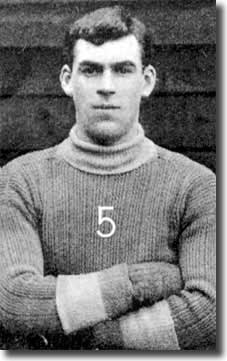 ball.'
ball.'
City had taken the lead, but as the gloom thickened they conceded three
goals in quick succession. Billy Scott, playing only his second game of
the season in the absence of the injured Hogg, claimed he was unable to
see the last two shots.
Studd: 'The result stood because the referee, after consulting his linesmen,
decided that Scott could have seen the ball coming at him. A furious Chapman
regarded the affair as an outrage, and assured the referee he would lodge
an appeal against "this insult" ... The incident goes a long
way to explaining Chapman's later enthusiasm for floodlit football.'
The outcome of City's appeal was recorded in the minutes of the meeting
of the Football League Management Committee on 17 March: 'On behalf of
Leeds City it was urged that Clapton Orient fixed the kick off at the
unreasonably late hour of 4.30, notwithstanding a protest by the visiting
club that it was too late; that on arriving at the ground they were asked
by Clapton Orient to kick off at 4.20, to which they agreed, but the game
did not commence until 4.29; that though no interval was taken the game
did not finish until 6-7 pm; that during the second half Leeds City players
claimed that the light was too bad for football; that the referee himself
had considerable doubt as to the light some time before the end of the
game, as he consulted the linesmen; and that it was so dark that when
the last two goals were scored by Clapton Orient the goalkeeper and full-backs
of Leeds City did not see the ball.
'"The Committee decided that there was no rule or precedent entitling
them to interfere with the result, and the match therefore must stand.
back to top
'The Committee were further of opinion that the time fixed for the kick
off was unduly late, and that in consequence the game was played in a
bad light during the closing minutes. Further, it was clear that Clapton
Orient realised that the light was not likely to hold out and shortly
before the match suggested an earlier kick off. Such was contrary to the
decisions of the Management Committee, and the action of the Clapton Orient
club in fixing the kick off so late accounted for all the trouble.
'The Clapton Orient Club were, therefore, fined 25 guineas out of which
the expenses of Leeds City and the referee and linesmen will be paid.'
The findings were of scant consolation to City, who had missed out on
vital League points, and they dropped another when drawing 1-1 at Bury
on 7 March.
Hogg was back in goal, but Speirs was out through injury. Price moved
to inside-left to cover and Sharpe onto the right wing to allow Croot
to come in at No 11.
The changes didn't adversely affect City and they played well, coming
close to scoring twice in the first ten minutes. Bury were denied a penalty
when the referee refuted claims that Affleck had handled in the area,
but almost immediately the Gigg Lane side were successful with a second
appeal after Foley was adjudged to have handled. Perry netted from the
spot.
Within fifteen minutes, City were level. Foley, as if to atone for his
sins, put Jackson through. He played a one two with Sharpe and scored
from the return pass.
McLeod had an off day, but was on fire a week later, netting a hat trick
against Huddersfield as City won 5-1. Town took the lead after ten minutes
and dominated the first half hour. Hampson headed home a Croot corner
in the 30th minute to bring the sides level and McLeod edged City ahead
a minute before the break. From then on it was all Leeds and they secured
an emphatic victory.
Defeat by a single goal the following week away to struggling Lincoln
City was a grim wake up call. The Evening Post: 'Leeds City were
a sadly disappointing team at Lincoln ... They were extremely lucky in
escaping with such a narrow margin of defeat, for 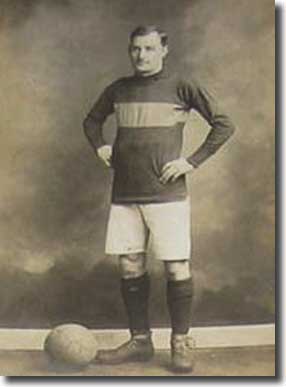 Lincoln
City failed to convert a penalty and one of their forwards missed an open
goal. The visitors ... were accompanied by nearly a thousand supporters,
who could not restrain their disgust at the tame and listless display
which their favourites gave.'
Lincoln
City failed to convert a penalty and one of their forwards missed an open
goal. The visitors ... were accompanied by nearly a thousand supporters,
who could not restrain their disgust at the tame and listless display
which their favourites gave.'
The Leeds Mercury lamented, 'It is now practically certain that
Leeds City are not to get promotion this season.' The epitaph was somewhat
premature, and when City beat Blackpool 2-1 on March 28 they were suddenly
back in with a chance as Hull and Woolwich Arsenal lost and Bradford drew
at home to Barnsley. The Yorkshire Post piped up, 'Leeds ... are
not the only team among the candidates suffering from staleness just now.'
The following week they faced struggling Nottingham Forest, whom they
had thrashed 8-0 in November. It was astonishing, therefore, that City
should slip up once more, losing 2-1.
The Mercury: 'Woolwich and Bradford again failed to get on the
winning side, but Leeds City lost ... Thus have they again greatly jeopardised
their chance of promotion ... It is perfectly true that they had a certain
amount of bad luck inasmuch as Hampson and Croot each hit the crossbar,
but it cannot be said that they were unfortunate to lose.'
While the team were having such a wretched time in the East Midlands,
Elland Road was the scene of a high profile occasion.
Despite the memory of disastrous outcomes when the stadium had previously
staged prestigious FA Cup-ties, the Football Association chose Elland
Road to host the Amateur Cup final that same afternoon, 4 April.
In March 1910, the FA selected Elland Road as the venue for the semi
final between Barnsley and Everton. The occasion was ruined by inept administration.
Club officials claimed that the stadium could comfortably house 50,000
spectators. The gates were closed an hour before kick off with less than
40,000 inside as fans swarmed towards the site from all directions.
Undeterred by the farcical scenes, two years later the FA opted for Elland
Road again when a neutral venue was required for a replay after Bradford
City and Barnsley drew in the fourth round. Again, the stadium was swamped
and club officials locked the turnstiles with thousands outside. The move
prompted a riot and an angry mob stormed the ground, causing a spill over
onto the pitch. They were ushered off eventually, but trespassed again
at half time and with play impossible, the referee abandoned the match.
back to top
In 1914, thankfully, the occasion went off without incident as Bishop
Auckland beat Northern Nomads 1-0. When the Lord Mayor of Leeds, Edward
Brotherton, had presented the trophy and medals after the game, he spoke
of the great enjoyment he had had from watching the game. The outcome
was something of a vindication for City's management, even though the
attendance was much more in keeping with the stadium's practical capacity.
The Easter programme had arrived, with the concentrated fixture list
expected to provide its customary clarification of key issues.
Leaders Notts County were without a fixture on Good Friday, April 10,
but the other teams were in action. City faced a stiff test at Bristol
City, a team with only defeat at home all season. They had conceded just
eight goals in11 games at Ashton Gate.
Leeds welcomed back Speirs after five matches out with a knee injury.
They played well and took the lead after eighteen minutes through McLeod.
Foley was left free from a throw in and sent over a beautiful cross to
find McLeod in 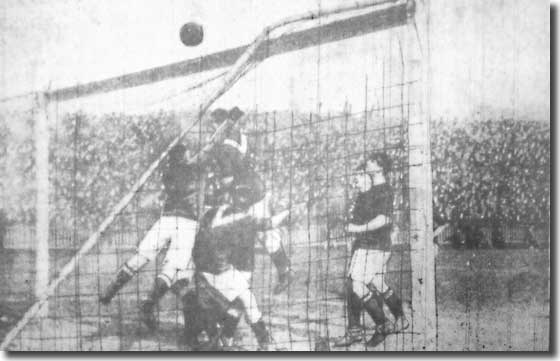 the
goal area. The centre-forward shot well but goalkeeper Ware parried the
ball. McLeod reacted quickest and slammed the loose ball into the roof
of the net. Within five minutes Bristol had equalised, though there was
a suspicion that goalscorer Brown used his hands in the process. The Citizens
persuaded the referee to consult the linesman, but the score was allowed.
There were no further goals and the outcome was a creditable draw.
the
goal area. The centre-forward shot well but goalkeeper Ware parried the
ball. McLeod reacted quickest and slammed the loose ball into the roof
of the net. Within five minutes Bristol had equalised, though there was
a suspicion that goalscorer Brown used his hands in the process. The Citizens
persuaded the referee to consult the linesman, but the score was allowed.
There were no further goals and the outcome was a creditable draw.
The big game the following day brought Woolwich Arsenal to Elland Road,
third against fourth, with the losers likely to see their promotion hopes
at an end.
City were once again missing Speirs, whose knee had given way against
Bristol. The Yorkshire Post: 'A strong wind made the task of controlling
the ball difficult, and for this reason a good many promising movements
on each side came to nothing. The City had to face the wind to commence
with, but they showed much the better form in the first quarter of an
hour. McLeod sent in a hot shot in the first half minute, and later there
were scoring efforts by the same player and Price, while on one occasion
Hampson made a desperate attempt to head the ball into the net. Gradually
the Arsenal rallied, and, aided by the wind, they gave the City defence
some anxious moments.
'The second period of play, which ran greatly in Leeds City's favour
was also unproductive, though the City thought they were unlucky in not
being allowed two claims for goals. In the one case, about a quarter of
an hour from the resumption, Sharpe sent across an excellently judged
flag kick. The ball bobbed about in front of goal until finally Hampson
jumped at it and headed it into the net. There was the usual hand shaking
at this success, but while the City players were congratulating themselves
on having scored, the referee was pointing to the goal line and ordering
a free kick for the Arsenal goalkeeper having been impeded.
'The other disallowed claims came in the last two or three minutes. There
had been a melee near the corner of the Arsenal goal, and Sharpe hooked
the ball away from Lievesley's reach. Benson ... rushed up and kicked
the ball out as the City men were appealing for the ball being in goal;
and the referee signalled for play to proceed.'
The goalless draw served as a benefit match for long serving winger Fred
Croot. He had been guaranteed £250, and with an attendance of 22,500 producing
receipts of £743, he eventually received £450, a fitting reward for an
outstanding servant.
The same day Notts County's 2-0 defeat of Bury confirmed both their promotion
and the title, while Bradford won and Hull lost at Wolverhampton.
The Easter Monday programme saw Bradford lose at Forest to undermine
their challenge. Previously, they had looked odds on to join Notts County
in the First Division, but now they were right back in the thick of things,
especially when Woolwich Arsenal's 4-0 hammering of Stockport was confirmed.
City's chances looked tenuous, but all they could do was win their games
and hope that other results would go in their favour. The Peacocks faced
Bristol City at Elland Road on Easter Monday without both Speirs and Hampson,
missing for only the second time since his arrival at the club. Neil
Turner was called up from the reserves to allow Ivan Sharpe to appear
in his favoured left wing role and centre-half Harry Peart made his debut.
Turner scored the only goal of the game after twenty-five minutes, allowing
City to secure both points, despite McLeod being a limping passenger in
the second half. He was kicked by Bristol keeper Ware, resulting in a
penalty for Leeds, but Sharpe's kick was saved by the custodian.
back to top
| |
Top of Division Two - 14 April 1914 |
| |
Pos
|
|
P
|
W
|
D
|
L
|
F
|
A
|
Pts
|
| |
1st
|
Notts
County |
37
|
23
|
7
|
7
|
76
|
34
|
53
|
| |
2nd
|
Bradford
Park Avenue |
36
|
21
|
3
|
12
|
64
|
46
|
45
|
| |
3rd
|
Woolwich
Arsenal |
35
|
18
|
8
|
9
|
48
|
36
|
44
|
| |
4th
|
Leeds
City |
36
|
18
|
7
|
11
|
72
|
44
|
43
|
| |
5th
|
Clapton
Orient |
36
|
16
|
9
|
11
|
45
|
33
|
41
|
| |
6th
|
Barnsley |
36
|
17
|
7
|
12
|
48
|
44
|
41
|
| |
|
|
|
|
|
|
|
|
|
The hectic programme went on for City, as they faced Clapton Orient at
Elland Road the following day, their fourth game in five days. Victory
would take them above Woolwich Arsenal into third, just a point behind
second placed Bradford.
They welcomed back Hampson, but Speirs was still unfit and Leeds now
had to contend with the absence of Billy McLeod. Joe Dougherty, signed
from Darlington Forge in February, was consequently given his debut.
Much of the creative burden fell upon Ivan Sharpe. He played well enough
and City enjoyed most of the play, but they were clearly tired. With Orient
defenders spending the last twenty minutes obsessively hoofing the ball
out of play to waste time, City could not find a way through and the game
ended goalless.
In memory of the earlier contentious game between the two sides, wags
in the crowd offered candles and 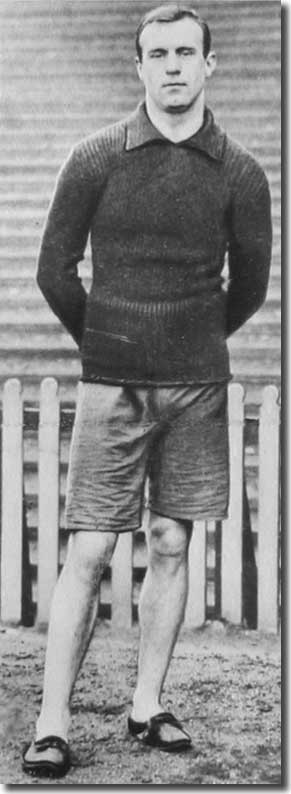 matches
to Orient goalkeeper Bower to ensure he would be able to see the ball!
matches
to Orient goalkeeper Bower to ensure he would be able to see the ball!
The draw left Leeds fourth, two points behind Bradford and one shy of
Arsenal, with two games left to play. Promotion was now very much an outside
bet for the Peacocks.
Luck was with them in the next fixture, away to Grimsby on April 18,
with Tommy Lamph making his debut at left-half. The wind diverted a centre
by Arthur Price into the net for the only goal of the contest.
The same afternoon, Bradford won 3-0 at Lincoln, but the Arsenal had
to be content with a draw against Clapton. This allowed City to rise to
third, but when the Gunners won their game in hand in midweek against
Grimsby the two teams alternated positions. Leeds had 45 points, both
their rivals 47, and all had one match remaining, on their home soil,
on April 25. City had the most favourable goal average but would need
to beat Birmingham, and pray that Arsenal and Bradford both lost, to Grimsby
and Blackpool respectively. It was a very tall order.
There was no miracle. The Peacocks, with Speirs finally restored to their
ranks, beat Birmingham 3-2, but both of their rivals enjoyed emphatic
victories, with Bradford's superior goal average taking them up.
City took the lead after ten minutes when Price shot home from a McLeod
pass. Birmingham equalised, but then the home men went ahead again when
Stanton conceded an own goal as he attempted to clear. Birmingham levelled
once more just before the break from a free kick. Leeds regained the lead
almost from the restart when Hauser could not hold a fiery drive by Sharpe,
allowing McLeod to tap home the rebound. There were no further scores.
News was filtering through that their rivals were winning, and there
was an understandable lack of vigour in a typical end of the season match.
The points were secured, but there was little celebration, though the
fourth place finish earned each player a £10 bonus.
Too many things had gone against City after Christmas: their poor run
in January, the controversial defeat in the darkness at Clapton, the capitulation
at Forest and Lincoln, and the loss of Speirs' intelligence and creativity
for nine crucial games during the run in, when they won just eleven points.
Leeds City finished with six points fewer than champions Notts County,
but only two less than Bradford and Arsenal. 'Promotion has been denied
them but taking into account the resources of the club, fourth place should
be considered satisfactory,' said the Yorkshire Post. 'Not only
have the club attained a higher position than ever before but receipts
and attendances have outstripped any previous record.'
Herbert Chapman recognised the lack of reserve strength as a key weakness,
with the second string finishing bottom of their league. In March, in
a bid to remedy matters, he recruited John Chaplin, a former Spurs, Manchester
City and Dundee player, to serve as assistant trainer with special responsibility
for improving the reserves.
There had been an astonishing turnaround in the two seasons since Chapman
had arrived at the club. City had gone from begging for survival to a
place among the Second Division's elite. They were a formidable outfit
at Elland Road, where they lost two games and conceded 16 goals. Their
away form was also more robust.
After such a promising season, the supporters could anticipate 1914/15
with real hope and enthusiasm, but the summer's events were to bring a
sudden and devastating halt to any further progress.
Part 1 A team to be feared - Results
and table













 visited
Pennington's shop in Smethwick in November and asked him whether it would
be possible to influence the outcome of Albion's match with Everton at
the end of the month. He offered Pennington £55, or £5 for each player,
in the event of a draw or an Albion defeat. Bioletti refused to pay until
after the match, but agreed to formally document his commitment on a memorandum
sheet. Pennington reported the details of the exchange to his club chairman
and the police and showed them the memorandum.
visited
Pennington's shop in Smethwick in November and asked him whether it would
be possible to influence the outcome of Albion's match with Everton at
the end of the month. He offered Pennington £55, or £5 for each player,
in the event of a draw or an Albion defeat. Bioletti refused to pay until
after the match, but agreed to formally document his commitment on a memorandum
sheet. Pennington reported the details of the exchange to his club chairman
and the police and showed them the memorandum. beat Pennington for the choice of ends, and thus gave Leeds City the assistance
of the breeze in the first half.
beat Pennington for the choice of ends, and thus gave Leeds City the assistance
of the breeze in the first half. place at inside-right, Price going on to the wing. The forward line was
disjointed all through the piece.'
place at inside-right, Price going on to the wing. The forward line was
disjointed all through the piece.' ball.'
ball.' Lincoln
City failed to convert a penalty and one of their forwards missed an open
goal. The visitors ... were accompanied by nearly a thousand supporters,
who could not restrain their disgust at the tame and listless display
which their favourites gave.'
Lincoln
City failed to convert a penalty and one of their forwards missed an open
goal. The visitors ... were accompanied by nearly a thousand supporters,
who could not restrain their disgust at the tame and listless display
which their favourites gave.' the
goal area. The centre-forward shot well but goalkeeper Ware parried the
ball. McLeod reacted quickest and slammed the loose ball into the roof
of the net. Within five minutes Bristol had equalised, though there was
a suspicion that goalscorer Brown used his hands in the process. The Citizens
persuaded the referee to consult the linesman, but the score was allowed.
There were no further goals and the outcome was a creditable draw.
the
goal area. The centre-forward shot well but goalkeeper Ware parried the
ball. McLeod reacted quickest and slammed the loose ball into the roof
of the net. Within five minutes Bristol had equalised, though there was
a suspicion that goalscorer Brown used his hands in the process. The Citizens
persuaded the referee to consult the linesman, but the score was allowed.
There were no further goals and the outcome was a creditable draw. matches
to Orient goalkeeper Bower to ensure he would be able to see the ball!
matches
to Orient goalkeeper Bower to ensure he would be able to see the ball!